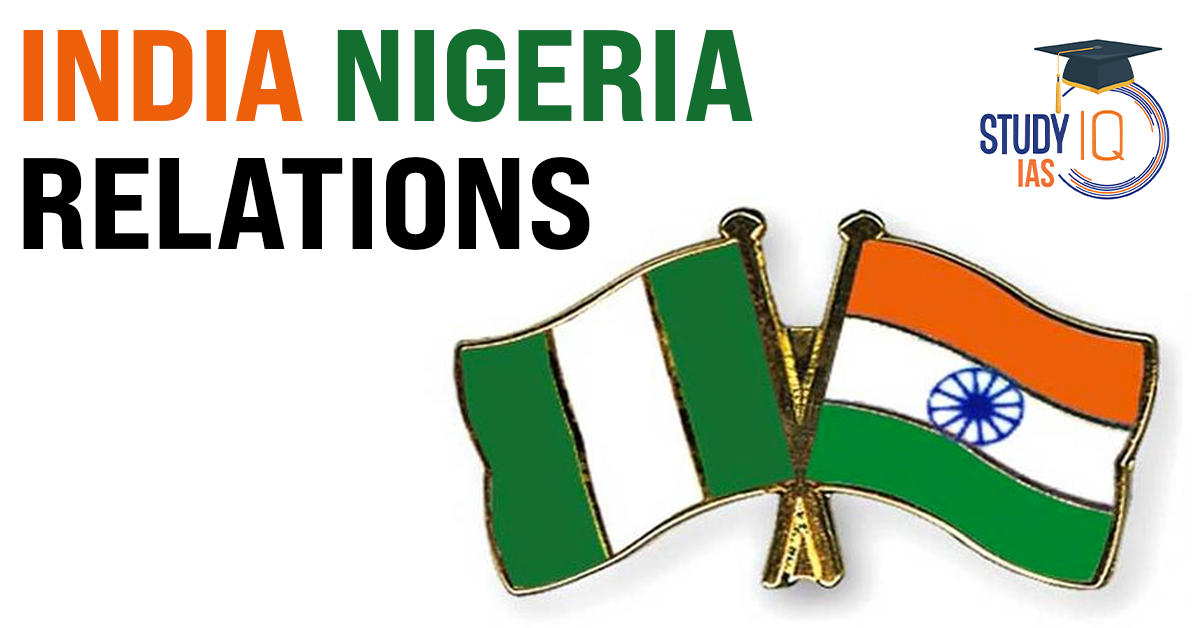Table of Contents
India And Nigeria Relations
- Bilateral Trade: Currently stands at $7.9 billion, down from a peak of $11.8 billion in 2022-23. India is Nigeria’s second-largest trading partner in Africa.
- Indian Investments: Over 150 Indian companies have investments in Nigeria worth approximately $27 billion.
- Indian Diaspora: Nearly 50,000 Indians reside in Nigeria, contributing positively to the local economy and regarded for their professionalism.
Challenges to Bilateral Engagement
- India’s bilateral trade with Nigeria is currently at half its peak from a decade ago.
- There has been a lack of regular high-level diplomatic engagements.
- g., Modi’s visit comes after 17 years, and the joint commission meeting in 2024 was the first in 13 years.
- India’s aid to Nigeria is currently channelled through the African Union, which may limit the direct impact of development assistance on bilateral relations.
Economic and Political Context in Nigeria
- Nigeria faces economic and security challenges, with President Bola Tinubu taking bold reform measures since 2023.
- Tinubu has withdrawn petroleum subsidies costing $10 billion annually, led to the Naira (Nigerian Currency) to depreciate, and dismissed several top officials, leading to economic turbulence and inflation.
- These reforms aim to rejuvenate the Nigerian economy, although they have sparked public dissatisfaction.
Strategic Areas of Cooperation
- Historical Context: The two countries share a legacy dating back over half a millennium. A notable historical figure is Baba Ghor, a gem merchant from Kano who settled in Gujarat around 1500 AD.
- Defence and Security: Nigeria seeks to upgrade its defence capabilities to combat terrorism and economic instability, particularly issues like Boko Haram and Gulf of Guinea piracy.
- India has experience in similar challenges and can provide a comprehensive package of defence supplies and training.
- 7 Nigerian Presidents have been trained as defence officers in India.
- Economic Stabilisation: Nigeria is facing a foreign exchange shortage and seeks India’s assistance for economic stabilisation.
- Potential areas for cooperation include:
- Partnerships for upstream hydrocarbons.
- Infrastructure development.
- A bilateral comprehensive economic partnership agreement.
- Financial facilitation through lines of credit and barter arrangements.
- Potential areas for cooperation include:
- Trade Opportunities: India could benefit from importing Nigerian goods such as palm oil, hides, ginger, and Gum Arabic to reduce its declining exports, which fell 29.7% year-on-year in 2023-24 to $3.6 billion.
- India’s services sector, including IT, banking, health care, and education, also has growth potential in Nigeria.


 German Chancellor Visit to India in 2026...
German Chancellor Visit to India in 2026...
 Iran Nuclear Crisis and India’s Role f...
Iran Nuclear Crisis and India’s Role f...
 H1B Visa Program, Beneficiaries, Eligibi...
H1B Visa Program, Beneficiaries, Eligibi...




















